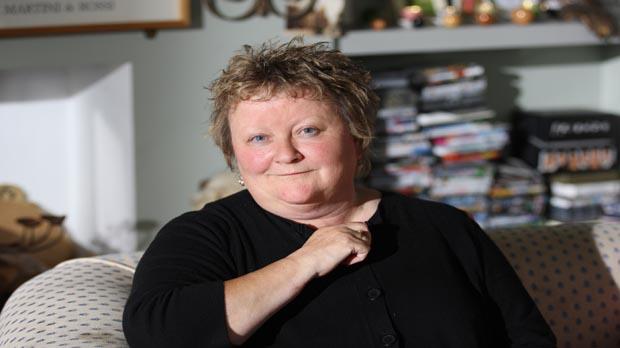
“Deborah agreed to take part in a trial as she was keen to help other cancer patients in the future. "If taking part in a trial means others might be helped then I’m very happy with that."
Please note - this trial is no longer recruiting patients. We hope to add results when they are available.
This trial is looking at drug called trastuzumab emtansine alongside pertuzumab for breast cancer. The trial is for people whose breast cancer has a large number of HER2 receptors (it is HER2 positive).
Doctors can treat breast cancer with surgery. After surgery if your breast cancer is HER2 positive you will have a biological therapy called trastuzumab (Herceptin). Trastuzumab works by seeking out cancer cells that have a particular protein. You may also have a  with trastuzumab.
with trastuzumab.
Pertuzumab is another type of biological therapy. It too looks for a particular protein on the cancer cell but works in a slightly different way to trastuzumab.
Trastuzumab emtansine (pronounced trast-oo-zoo-mab em-tan-seen) is a combination of trastuzumab and the chemotherapy drug emtansine. The trastuzumab finds the cancer cells and delivers the emtansine chemotherapy to them. This type of drug is called a conjugated monoclonal antibody.
In this trial the researchers want to compare
They want to find out which is best to stop HER2 positive breast cancer coming back after surgery. They also want out find out more about the side effects of the drugs in this trial.
You may be able to join this trial if all of the following apply
 )
)You cannot join this trial if any of these apply. You


This is an international phase 3 trial. The researchers need 2,500 people to join.
To start with everyone has an  . You have it every 3 weeks. Each 3 week period is called a cycle of treatment. You have 3 or 4 cycles of treatment. You have the anthracycline chemotherapy as an injection into a vein.
. You have it every 3 weeks. Each 3 week period is called a cycle of treatment. You have 3 or 4 cycles of treatment. You have the anthracycline chemotherapy as an injection into a vein.
You are then put into a treatment group by a computer. This is called randomisation. Neither you nor your doctor will be able to decide which group you are in.

You have all these drugs as an injection into a vein. You have them every 3 weeks. You can have up to 18 cycles of treatment as long as it helping you and the side effects aren’t too bad.
The trial team will ask you to fill out a questionnaire before you start treatment, every 3 weeks for 3 months, then every 2 months during treatment and at 6 months and 1 year after you finish treatment. The questionnaire will ask about side effects and how you’ve been feeling. This is called a quality of life study.
If you agree to take part in this study, the researchers will ask for a sample of your cancer that was removed when you had surgery. You must agree to this if you want to take part in the trial.
They will also ask for extra blood samples to look for substances ( ) that may help measure how well the treatment is working and to find out more about breast cancer. You don’t have to agree to this. You can still take part in the trial.
) that may help measure how well the treatment is working and to find out more about breast cancer. You don’t have to agree to this. You can still take part in the trial.
You see the doctor to have some tests before taking part in the trial. These tests include
 )
) or
or  )
)During treatment you see the doctor every 3 weeks for a physical examination and blood tests. You have a heart scan every 3 months.
Three weeks after finishing treatment you see the doctor for
After treatment you see the doctor for a physical examination and blood tests every 3 months for 2 years. After this you have a physical examination every 6 months for another 3 years and then every year for another 5 years.
You have a mammogram every year. You have regular heart scans for 5 years.
The most common side effects of trastuzumab emtansine include
The most common side effects of trastuzumab include
The most common side effects of pertuzumab include
Your doctor will talk to you about the possible side effects of treatment before you agree to take part in the trial.
We have information about the side effects of
Please note: In order to join a trial you will need to discuss it with your doctor, unless otherwise specified.
Dr Mark Verrill
Roche
If you have questions about the trial please contact our cancer information nurses
Freephone 0808 800 4040

“Deborah agreed to take part in a trial as she was keen to help other cancer patients in the future. "If taking part in a trial means others might be helped then I’m very happy with that."